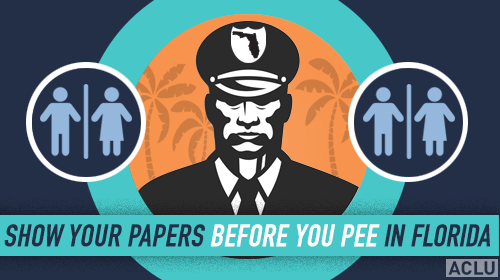
Getting arrested for using the bathroom could become the law in Florida.
Using a public restroom is something most people have done. For many non-transgender people, the experience might be gross or inconvenient, but most people don't have serious concerns about whether they will be harassed, attacked, or arrested when walking into a bathroom. But for most trans people, this is precisely what we think about every time we walk into the bathroom.
In a 2012 survey, 53 percent of transgender respondents reported harassment when trying to access a public place like a hospital, restroom, or retail establishment. Among black transgender respondents, 22 percent reported experiencing physical attacks while accessing public establishments. These verbal and physical attacks are part of the larger pattern of violence that transgender people experience – violence that has already resulted in the murder of at least seven transgender women since the start of this year.
So, how are state legislatures responding to this crisis in the trans community? With ill-conceived proposals that would make transgender people targets of further harassment and arrest for using the bathroom.
Yesterday a bill moved forward in a Florida House committee that would make it a crime to use a restroom that does not match the sex listed on a person's birth certificate or other government-issued identification. Introduced in direct response to Miami-Dade County's efforts to prohibit discrimination against transgender people, the bill's purpose, according to its sponsor Rep. Frank Artiles, is to protect "public safety" and prevent "criminals — males" from going into a "women's locker room … say[ing] …'I feel like a woman today.'"
But the bill actually undermines "public safety" if you consider trans and gender non-conforming people part of the public. It allows the businesses and patrons to police and punish women and men who do not conform to expectations of how women and men "should" look. It further forces transgender women, and all transgender people, to defend our right to exist in the world when doing something as basic as going to the bathroom. It invites business owners and the public to question trans people's core identity. And it encourages violence against us.
Imagine going through the world having fought to be yourself and then having your state representatives try to pass a law that equates your very identity with danger and criminality. That is what this law does.
Bill opponents responded to the legislation by explaining that not only would the proposed law increase violence against transgender people, but it also might prevent a parent from accompanying their child to the restroom or make it more difficult for a person with disabilities who is accompanied by an aide to use the restroom.
Rather than simply pull the discriminatory bill, Florida lawmakers amended it to make clear that it was and is designed for one purpose: to target transgender people.
Going to great lengths to ensure that no one else is negatively impacted, lawmakers have even carved out an exception for "[a] person who enters an unoccupied single-sex facility that is designated for the opposite sex while another person waits outside the entrance to the facility notifying others that a person of the opposite sex is using the facility." Apparently the bill sponsors wanted to make sure there's no criminal penalty for the "buddy system" women use to cope with long lines for the ladies' room.
Meanwhile, as trans people are being killed across the country, other similar bills are also being considered in Kentucky and Texas.
These bills send a clear message to trans people: You are not worthy of legal protections, and your humanity is not respected here.
Join our efforts to defeat this cruel bill and send a message that trans lives matter.
Learn more about transgender rights and other civil liberty issues: Sign up for breaking news alerts, follow us on Twitter, and like us on Facebook.


